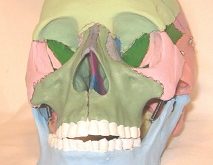Verb: adjoin
Pronunciation:(u’joyn)
Adjoin meaning:
- Lie adjacent to another or share a boundary
Synonyms: border, edge, abut, march, butt, butt against, butt on

- Be in direct physical contact with; make contact
Synonyms: touch, meet, contact
- Attach or add
Derived forms: adjoined, adjoining, adjoins
Quotations:
- Suzanne Collins – Peeta and I had adjoining cells in the capitol. We’re very familiar with each other’s screams.
- Alice Sebold – Buckley followed the three of them into the kitchen and asked, as he had at least once a day, Where’s Susie? They were silent. Samuel looked at Lindsey.Buckley, my father called from the adjoining room, come play Monopoly with me. My brother had never been invited to play Monopoly. Everyone said he was too young, but this was the magic of Christmas. He rushed into the family room, and my father picked him up and sat him on his lap. See this shoe? my father said.Buckley nodded his head. I want you to listen to everything I say about it, okay? Susie? my brother asked, somehow connecting the two. Yes, I’m going to tell you where Susie is. I began to cry up in heaven. What else was there for me to do? This shoe was the piece Susie played Monopoly with, he said. I play with the car or sometimes the wheelbarrow. Lindsey plays with the iron, and when you mother plays, she likes the cannon. Is that a dog? Yes, that’s a Scottie. Mine! Okay, my father said. He was patient. He had found a way to explain it. He held his son in his lap, and as he spoke, he felt Buckley’s small body on his knee-the very human, very warm, very alive weight of it. It comforted him. The Scottie will be your piece from now on. Which piece is Susie’s again? The shoe? Buckley asked. Right, and I’m the car, your sister’s the iron, and your mother is the cannon. My brother concentrated very hard. Now let’s put all the pieces on the board, okay? You go ahead and do it for me. Buckley grabbed a fist of pieces and then another, until all the pieces lay between the Chance and Community Chest cards. Let’s say the other pieces are our friends? Like Nate? Right, we’ll make your friend Nate the hat. And the board is the world. Now if I were to tell you that when I rolled the dice, one of the pieces would be taken away, what would that mean? They can’t play anymore?Right. Why?Buckley asked.He looked up at my father; my father flinched. Why? my brother asked again.My father did not want to say because life is unfair or because that’s how it is. He wanted something neat, something that could explain death to a four-year-old He placed his hand on the small of Buckley’s back. Susie is dead, he said now, unable to make it fit in the rules of any game. Do you know what that means? Buckley reached over with his hand and covered the shoe. He looked up to see if his answer was right.My father nodded. “You won’t see Susie anymore, honey. None of us will. My father cried. Buckley looked up into the eyes of our father and did not really understand.Buckley kept the shoe on his dresser, until one day it wasn’t there anymore and no amount of looking for it could turn up.
- Simone Weil – The world is the closed door. It is a barrier. And at the same time it is the way through.Two prisoners whose cells adjoin communicate with each other by knocking on the wall. The wall is the thing which separates them but it is also their means of communication. Every separation is a link.
- P.G. Wodehouse – The least thing upset him on the links. He missed short putts because of the uproar of the butterflies in the adjoining meadows.
- Jennifer L. Armentrout – Yes? Came the thin and reedy voice.I winced as I pushed the door open. Beth sounded terrible. And when I got an eyeful of her, she looked just as bad. Sitting up against the headboard with a mountain of blankets piled around her, she had dark circles under her eyes. Her pale, waif like features were sharp, and her hair was an unwashed, tangled mess. I tried not to breathe too deeply, because the room smelled of vomit and sweat.I halted at the bed, shocked to my core. Are you sick? Her unfocused gaze drifted away from me, landing on the door to the adjoined bathroom, it didn’t make sense. Hybrids we couldn’t get sick. Not the common cold or the most dangerous cancer. Like the Luxen, we were immune to everything out there in terms of disease, but Beth? Yeah, she wasn’t looking too good.A great sense of unease blossomed in my belly, stiffening my muscles. Beth?Her watery stare finally drifted to me. Is Dawson back yet? My heart turned over heavily, almost painfully. The two of them have been through so much, more than Daemon and I had, and this. God, this wasn’t fair. No, he’s not back yet, but you? You look sick. She raised a slim, pale hand to her throat. I’m not feeling very well. I didn’t know how bad this was, and I was almost afraid to find out. What’s wrong? One shoulder rose, and it looked like it had taken great effort. You shouldn’t be worried, she said, her voice low as she picked at the hem of a blanket. It’s not a big deal. I’ll be okay once Dawson comes back. Her gaze floated off again, and as she dropped the edge of the blanket, she reached down, put her hand over her blanket-covered belly, and said, We’ll be okay once Dawson comes back. We’ll be ? I trailed off as my eyes widened. My jaw came unhinged and dropped as I gaped at her.I stared at where her hand was and watched in dawned horror as she rubbed her belly in slow, steady circles.Oh no. oh, hell to the no to the tenth power.I started forward and then stopped. Beth, are you pregnant?
- Emmanuelle de Maupassant – On many nights I have availed myself of these very gentlemen, in the adjoining room. Each time, I wondered if you might arrive and see me, as I took my pleasure, allowing their hands to explore my body. There is no part of me that has not been kissed and enjoyed. I opened myself in welcome, encouraging my suitors to bury themselves deep and hard, to obliterate all reserve and find the heart of me.
- Saul Bellow – Everybody knows there is no fineness or accuracy of suppression; if you hold down one thing you hold down the adjoining.
- Allie Burke – He kissed her, lay next to her on his bed, pulled her to him. Their foreheads pressed flat against one another, the admiration in their eyes intricately adjoined as one enchanted gaze, he said, “Stay.””Yes,” she said. She knew what he meant. Stay with me tonight, sleep in my bed with me tomorrow, but she meant it the other way. Forever.
- Charlotte Brontë – At that time, I well remember whatever could excite – certain accidents of the weather, for instance, were almost dreaded by me, because they woke the being I was always lulling, and stirred up a craving cry I could not satisfy. One night a thunder-storm broke; a sort of hurricane shook us in our beds: the Catholics rose in panic and prayed to their saints. As for me, the tempest took hold of me with tyranny: I was roughly roused and obliged to live. I got up and dressed myself, and creeping outside the basement close by my bed, sat on its ledge, with my feet on the roof of a lower adjoining building. It was wet, it was wild, it was pitch dark. Within the dormitory they gathered round the night-lamp in consternation, praying loud. I could not go in: too resistless was the delight of staying with the wild hour, black and full of thunder, pealing out such an ode as language never delivered to man – too terribly glorious, the spectacle of clouds, split and pierced by white and blinding bolts.
- Cornell Woolrich – Then the bandit turned tail and broke for the open.Greeley hit the sidewalk only seconds after him, big as he was and with a panic-stricken woman to detour around. A slice of hindmost heel was all he saw of the man. The store entrance adjoined a corner; that gave the fugitive a few added seconds of shelter, and as Greeley flashed around it in turn, again the breaks were the lawbreaker’s.There was a school midway up the street toward the next avenue. It was a couple of minutes past three now, and a torrent of young humanity came pouring out of the building by every staircase and exit, flooding the street. In through them the sprinting man plunged, knocking over right and left the ones that didn’t get out of his way quickly enough. If it had been hazardous to take a shot at him in the store, it would have been criminal out here.The kids parted, screaming in delighted excitement, as Greeley tore through them after the bandit with up tilted gun, but he couldn’t just callously knock them flat like the man before him had. He sidestepped, got out of their way as often as they did his, and he began to fall behind the other, lose ground.The kids weren’t just on that one street – they had dispersed over the entire vicinity by now, for a radius of a block or more in every direction, in frisky, milling, homeward-bound groups. Through them the quarry zigzagged, pulling slowly but surely away. He kept going in a straight line, because it was to his advantage to do so – the presence of these kids made for greater safety – but he was already far enough in the lead so that when he should finally decide to turn off – the answer was pretty obvious; a taxi or a doorway or a basement. Any of them would do.
Sample sentences:
- I died for beauty but was scarceAdjusted in the tomb,When one who died for truth was lain In an adjoining room.He questioned softly why I failed?”For beauty,” I replied.”And I for truth, the two are one;We brethren are,” he said.And so, as kinsmen met a night,We talked between the rooms,Until the moss had reached our lips,And covered up our names.
- Totalitarianism is not only hell, but all the dream of paradise– the age-old dream of a world where everybody would live in harmony, united by a single common will and faith, without secrets from one another. Andre Breton, too, dreamed of this paradise when he talked about the glass house in which he longed to live. If totalitarianism did not exploit these archetypes, which are deep inside us all and rooted deep in all religions, it could never attract so many people, especially during the early phases of its existence. Once the dream of paradise starts to turn into reality, however, here and there people begin to crop up who stand in its way. and so the rulers of paradise must build a little gulag on the side of Eden. In the course of time this gulag grows ever bigger and more perfect, while the adjoining paradise gets even smaller and poorer.
- Peeta and I had adjoining cells in the Capitol. We’re very familiar with each other’s screams. Annie, who’s on Johanna’s other side, does that thing where she covers her ears and exits reality. Finnick shoots Johanna an angry look as his arm encircles Annie.What? My head doctor says I’m not supposed to censor my thoughts. It’s part of my therapy, replies Johanna.
- Begin this moment, wherever you find yourself, and take no thought of the morrow. Look not to Russia, China, India, not to Washington, not to the adjoining county, city or state, but to your immediate surroundings. Forget Buddha, Jesus, Mohammed and all the others. Do your part to the best of your ability, regardless of the consequences. Above all, do not wait for the next man to follow suit.
- Oh, hello, me lovely, we haven’t met. Asmodeus, demon extraordinaire, at your service. Any service you may require, especially those that involve nudity and adjoining body parts joining other people’s body parts.
- The addict’s reliance on the drug to reawaken her dulled feelings is no adolescent caprice. The dullness is itself a consequence of an emotional malfunction not of her making: the internal shutdown of vulnerability. From the latin word vulnerare, to wound, vulnerability is our susceptibility to be wounded. This fragility is part of our nature and cannot be escaped. The best the brain can do is to shut down conscious awareness of it when pain becomes so vast or unbearable that it threatens to overwhelm our capacity to function. The automatic repression of painful emotions is a helpless child’s prime defence mechanism and can enable the child to endure trauma that would otherwise be catastrophic. The unfortunate consequence is a wholesale dulling of emotional awareness. Everybody knows there is no fineness or accuracy of suppression, wrote the American novelist Saul Bellow in The Adventures of Augie March; if you hold down one thing you hold down the adjoining. Intuitively we all know that it’s better to feel than not to feel. Beyond their energizing subjective change, emotions have crucial survival value. They orient us, interpret the world for us and offer us vital information. They tell us what is dangerous and what is benign, what threatens our existence and what will nurture our growth. Imagine how disabled we would be if we could not see or hear or taste or sense heat or cold or physical pain. Emotional shutdown is similar. Our emotions are an indispensable part of our sensory apparatus and an essential part of who we are. They make life worthwhile, exciting, challenging, beautiful and meaningful. When we flee our vulnerability, we lose our full capacity for feeling emotion. We may even become emotional amnesiacs, not remembering ever having felt truly elated or truly sad. A nagging void opens, and we experience it as alienation, as profound as ennui, as the sense of deficient emptiness.
- He was ‘nuts about her’, as the parlance of the day had it, as if it were generally recognised that love and madness are adjoining rooms with extremely porous walls.
- Inaction is not the same thing as patience. It is instead a kind of perpetual waiting room, a sterile holding pen for unlived desire, a negative sanctuary. You wait and wait, but the receptionist is very stern and, somehow, the appointment book always full. To make matters worse, crowded into the adjoining cell like so many desperate immigrants, and separated from you by nothing more than the thin permeable wall of your own fear, are all the anticipated rejections of your life. You would think it might be noisy in there, but you’d be wrong. It is totally silent. There’s a small Plexiglas window through which you can study these things, this silence, if you have the inclination and the nerve. And eventually, if you have been a diligent enough student and not wasted your time in dreaming, you come to understand that it is not the rejections that make this a prison, not the defeats, but rather your own grim expectation of defeat; not life but its bodily outline drawn in chalk, where the body should be but isn’t, where it once was, this ingrained cowardly pessimism, this relentless betting against love and instinct. This is where the silence comes from.
- my gray zone is starting to include poetry here white is not absolute white black is not absolute black the edges of these non-colors adjoin
- Laura had warned him not to expect much. It was a good thing. “Have you and Kate been smoking grass in here?””That’s all she ever does on her lunch hour.We really have to get her into a program.” Thrilled with herself, Margo spread her arms. “So,what do you think?””Uh-huh.It’s a building, all right.””Josh.””Give me a minute.” He walked past her into the adjoining room, came back, looked into the bath, gazed up the pretty, and potentially lethal, staircase. He wiggled the banister, winced. “Want a lawyer?
- His ranch adjoined the Rio Grande, the river that formed the boundary between the United States and Mexico, with its poverty, caste system, and systemic corruption. So the poor Mexicans migrated. Over thirteen million of them, over a fifth of the Mexican population, had crossed that border illegally in the last fifty years and were grubbing for work in the United States, usually for minimum wage, or living on welfare and food stamps. Illiterate, unskilled, and usually unable to speak English, they flooded the schools with their children, kept blue-collar wages low, and formed an underclass that resisted assimilation and required huge amounts of public assistance dollars.
- Daddy, what if the monster comes tonight? He wouldn’t dare! Not with Miss Meadows and her magic, he teased. I smiled. Ok, Brianne whispered trustingly. Sweet dreams, my loves. Night, Daddy! There was a pause, then another cause for a smile tonight. Goodnight, Miss Meadows. Sweet dreams. My heart fluttered at hearing his farewell called through the adjoining rooms. Had he known I was listening? Good night, I called back. His soft chuckle made a thrill go through me. It was followed by the closing of the girl’s door.
- The God you imagine looks like Father Brennan, the man who baptized you: tall and Irish, with white hair and kind blue eyes, shooting a basketball in black vestments on the parish playground. The Virgin is one of the nuns who ran the adjoining schoolhouse: a spinster with a downy chin, her veil a habit. Old and sacred words, they taught you. You would not invent your own any more than you would try to build your own cathedral. Bead by bead, you whisper the same words Saint Peter spoke in Rome, the same words spoken today by all believers in São Paulo and Boston and Limerick and Cebu.
- A breakfast-room adjoined the drawing-room, I slipped in there. It contained a bookcase: I soon possessed myself of a volume, taking care that it should be one stored with pictures. I mounted into the window-seat: gathering up my feet, I sat cross-legged, like a Turk; and, having drawn the red moreen curtain nearly close, I was shrined in double retirement. Folds of scarlet drapery shut in my view to the right hand; to the left were the clear panes of glass, protecting, but not separating me from the drear November day. At intervals, while turning over the leaves of my book, I studied the aspect of that winter afternoon. Afar, it offered a pale blank of mist and cloud; near a scene of wet lawn and storm-beat shrub, with ceaseless rain sweeping away wildly before a long and lamentable blast. I
- On the land adjoining La Grenouillère strollers were sauntering under the gigantic trees which help to make this part of the island one of the most delightful parks imaginable. Busty women with peroxided hair and nipped-in waists could be seen, made up to the nines with blood red lips and black-kohled eyes. Tightly laced into their garish dresses they trailed in all their vulgar glory over the fresh green grass. They were accompanied by men whose fashion-plate accessories, light gloves, patent-leather boots, canes as slender as threads and absurd monocles made them look like complete idiots.
- Every single emergency room in every single hospital adjoining or near a college campus stocks extra supplies on Thursday nights rape kits for the sexual assault victims, IV fluids for those who are dehydrated from alcohol-induced vomiting, and blood for drunk driving accidents.
- It is a common misconception, in the spirit of the sentiments expressed in Q16, that Godel’s theorem shows that there are many different kinds of arithmetic, each of which is equally valid. The particular arithmetic that we may happen to choose to work with would, accordingly, be defined merely by some arbitrarily chosen formal system. Godel’s theorem shows that none of these formal systems, if consistent, can be complete; so-it is argued-we can keep adjoining new axioms, according to our whim, and obtain all kinds of alternative consistent systems within which we may choose to work. The comparison is sometimes made with the situation that occurred with Euclidean geometry. For some 21 centuries it was believed that Euclidean geometry was the only geometry possible. But when, in the eighteenth century, mathematicians such as Gauss, Lobachevsky, and Bolyai showed that indeed there are alternatives that are equally possible, the matter of geometry was seemingly removed from the absolute to the arbitrary. Likewise, it is often argued, Godel showed that arithmetic, also, is a matter of arbitrary choice, any one set of consistent axioms being as good as any other.
- Thus, as I believe, natural selection will tend in the long run to reduce any part of the organisation, as soon as it becomes, through changed habits, superfluous, without by any means causing some other part to be largely developed in a corresponding degree. And conversely, that natural selection may perfectly well succeed in largely developing an organ without requiring as a necessary compensation the reduction of some adjoining part.
- It is a common misconception, in the spirit of the sentiments expressed in Q16, that Godel’s theorem shows that there are many different kinds of arithmetic, each of which is equally valid. The particular arithmetic that we may happen to choose to work with would, accordingly, be defined merely by some arbitrarily chosen formal system. Godel’s theorem shows that none of these formal systems, if consistent, can be complete; so-it is argued-we can keep adjoining new axioms, according to our whim, and obtain all kinds of alternative consistent systems within which we may choose to work. The comparison is sometimes made with the situation that occurred with Euclidean geometry. For some 21 centuries it was believed that Euclidean geometry was the only geometry possible. But when, in the eighteenth century, mathematicians such as Gauss, Lobachevsky, and Bolyai showed that indeed there are alternatives that are equally possible, the matter of geometry was seemingly removed from the absolute to the arbitrary. Likewise, it is often argued, Godel showed that arithmetic, also, is a matter of arbitrary choice, any one set of consistent axioms being as good as any other.This, however, is a completely misleading interpretation of what Godel has demonstrated for us. He has taught us that the very notion of a formal axiomatic system is inadequate for capturing even the most basic of mathematical concepts. When we use the term ‘arithmetic’ without further qualification, we indeed mean the ordinary arithmetic which operates with the ordinary natural numbers 0,1,2,3,4,(and perhaps their negatives) and not with some kind of ‘supernatural’ numbers. We may choose, if we wish, to explore the properties of formal systems, and this is certainly a valuable part of mathematical endeavour. But it is something different from exploring the ordinary properties of the ordinary natural numbers. The situation is, in some ways, perhaps not so very unlike that which occurs with geometry. The study of non-Euclidean geometries is something mathematically interesting, with important applications, but when the term ‘geometry’ is used in ordinary language (as distinct from when a mathematician or theoretical physicist might use that term), we do indeed mean the ordinary geometry of Euclid. There is a difference, however, in that what a logician might refer to as ‘Euclidean geometry’ can indeed be specified (with some reservations) in terms of a particular formal system, whereas, as Godel has shown, ordinary ‘arithmetic’ cannot be so specified.Rather than showing that mathematics (most particularly arithmetic) is an arbitrary pursuit, whose direction is governed by the whim of Man, Godel demonstrated that it is something absolute, there to be discovered rather than invented. We discover for ourselves what the natural numbers are, and we do not have trouble in distinguishing them from any sort of supernatural numbers. Godel showed that no system of ‘man-made’ rules can, by themselves, achieve this for us. Such a Platonic viewpoint was important to Godel, and it will be important also for us in the later considerations of this book.
- the vocalizations. She concluded they were long-range vocals. Unable to sense her daughter’s presence in any of the adjoining pools, Kasatka was sending sounds far into the world, as far as she could, to see if they would bounce back or elicit a response. It was heartbreaking for all who heard what could easily be interpreted as crying.
- The drama, written and directed by Aya Ogawa for the Play Company, shows how the simulated can adjoin, infuse or ultimately replace the actual.
- El Dorado Seaside Suites and Hidden Beach Resort adjoin – but while one is nudist, the other is not.
- El Dorado Seaside Suites and Hidden Beach adjoin – but while one is nudist, the other is not.
- Mexico is a country whose borders adjoin with those of the United States.
- The two villages adjoin each other.
- The two buildings adjoin.
- Their farms adjoin.
 Spinfold VisualDictionary-Evolutree- Technorip-Amazing Facts and much more.
Spinfold VisualDictionary-Evolutree- Technorip-Amazing Facts and much more.





